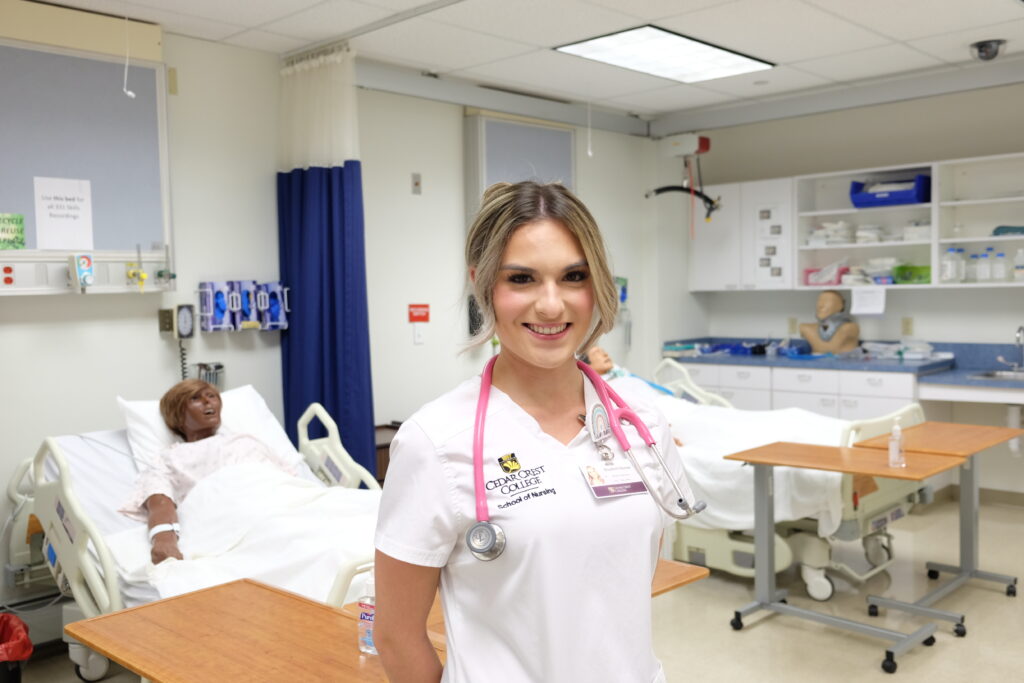
Cedar Crest College’s School of Nursing is leading the charge in addressing the nationwide shortage of forensic nurses with their new Certificate in Forensic Nursing. This innovative program has both an undergraduate and graduate option and is the first of its kind in the region, showcasing Cedar Crest’s commitment to addressing pressing healthcare needs.
The multidisciplinary Certificate in Forensic Nursing was designed to prepare nurses to fill a critical void in the workplace, and one with only increasing demand. Victims of violence, abuse, trauma, crime, and disasters can present in any healthcare setting, posing complex challenges for nurses. Too often, nurses grapple with uncertainty regarding the most effective strategies for addressing these issues – a hurdle Cedar Crest is actively addressing through this program. Graduates of this program will benefit from the excellence of Cedar Crest’s nursing and forensic programs, poising themselves to make a transformative impact, complete with specialized training to tackle complex challenges head-on.
Led by expert faculty in forensic science, social work, and nursing, the curriculum for the Certificate in Forensic Nursing covers a diverse range of subjects, including the history, evolution, and theoretical framework of forensic nursing, victimology, and legal and evidentiary issues in forensic nursing. Upon completion of the program, students will emerge as empowered leaders with the expertise to provide compassionate care for victims of crime, abuse, or disasters without inflicting additional trauma associated with improper examination, evidence collection, and preservation.
“Although forensic nursing is a subspecialty, it has evolved into its own distinct discipline,” says Lawrence Quarino, Director of the Forensic Science Program. “In 2022, the American Academy of Forensic Sciences inaugurated a new forensic nursing section because of the role forensic nurses play in all areas of trauma throughout the world. In addition, Forensic Nursing has two professional peer-reviewed journals, a professional organization, and their own certification body. With guidance from these groups, the certificate program at Cedar Crest hopes to meet the needs of nurses entering this vital area of nursing and of forensic science.”
The program is available to nurses with a diploma, associates, or bachelor’s degree in nursing from an accredited program and an unencumbered license as a registered nurse. The part-time, online program is delivered asynchronously in a 7-week accelerated format – with one on-campus immersion experience – so students can pursue the certificate while maintaining their schedule. Additionally, for students who want to pursue a master’s degree, precepted clinical hours obtained during Forensic Nursing II could be applied to the total clinical hours required for fulfillment of an MSN degree.
“Leveraging the esteemed tradition of excellence within Cedar Crest’s forensic science and nursing programs, the uniqueness of this certificate lies in its high-demand specialty, with principles applicable across various nursing specialties, from emergency rooms to skilled nursing facilities,” says Wendy Robb, Dean of the School of Nursing. “Providing the certificate at two tiers, for post-licensure nurses and those seeking master’s level credits, ensures accessibility to all registered nurses, ultimately enhancing care within our community. We’re thrilled to spearhead this transformative initiative.”
To learn more about this program, visit https://www.cedarcrest.edu/forensic-nursing.